Zoho CRM vs HubSpot: Comparing Features and Benefits
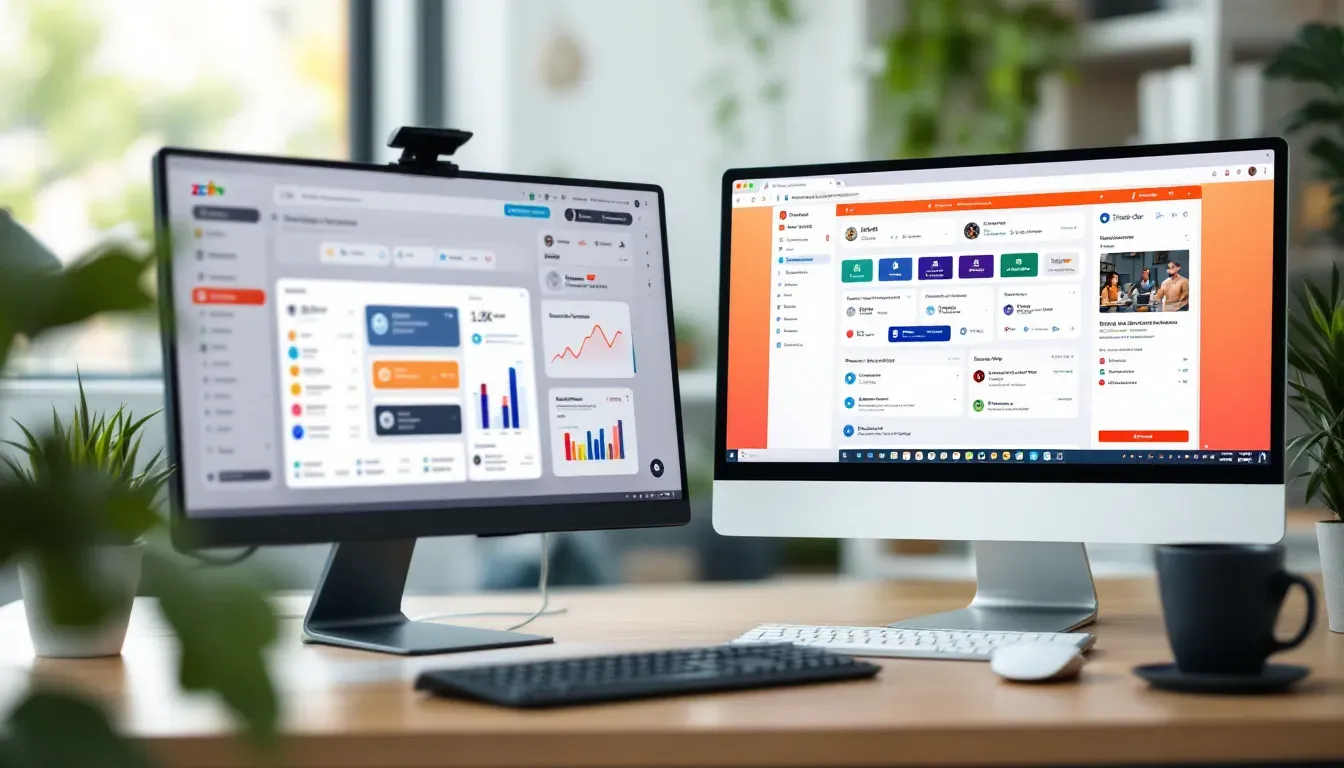
Choosing the right CRM can make or break your business’s success. At Drop Cowboy, we understand the importance of this decision.
In this post, we’ll compare two popular options: Zoho CRM vs HubSpot. We’ll explore their features, pricing, and ideal use cases to help you make an informed choice for your company.
What Makes Zoho CRM Stand Out?
Zoho CRM is a powerful customer relationship management solution that offers significant benefits for businesses of all sizes. This platform excels in sales force automation, providing tools that optimize lead and deal management processes. Sales-driven organizations looking to enhance their pipelines will find Zoho CRM particularly attractive.
Feature-Rich Platform
Zoho CRM’s AI assistant, Zia, stands out as a key feature. This intelligent tool enriches customer data and maintains a clean database, which saves sales teams countless hours of manual work. As a result, they can focus more on closing deals rather than data entry.
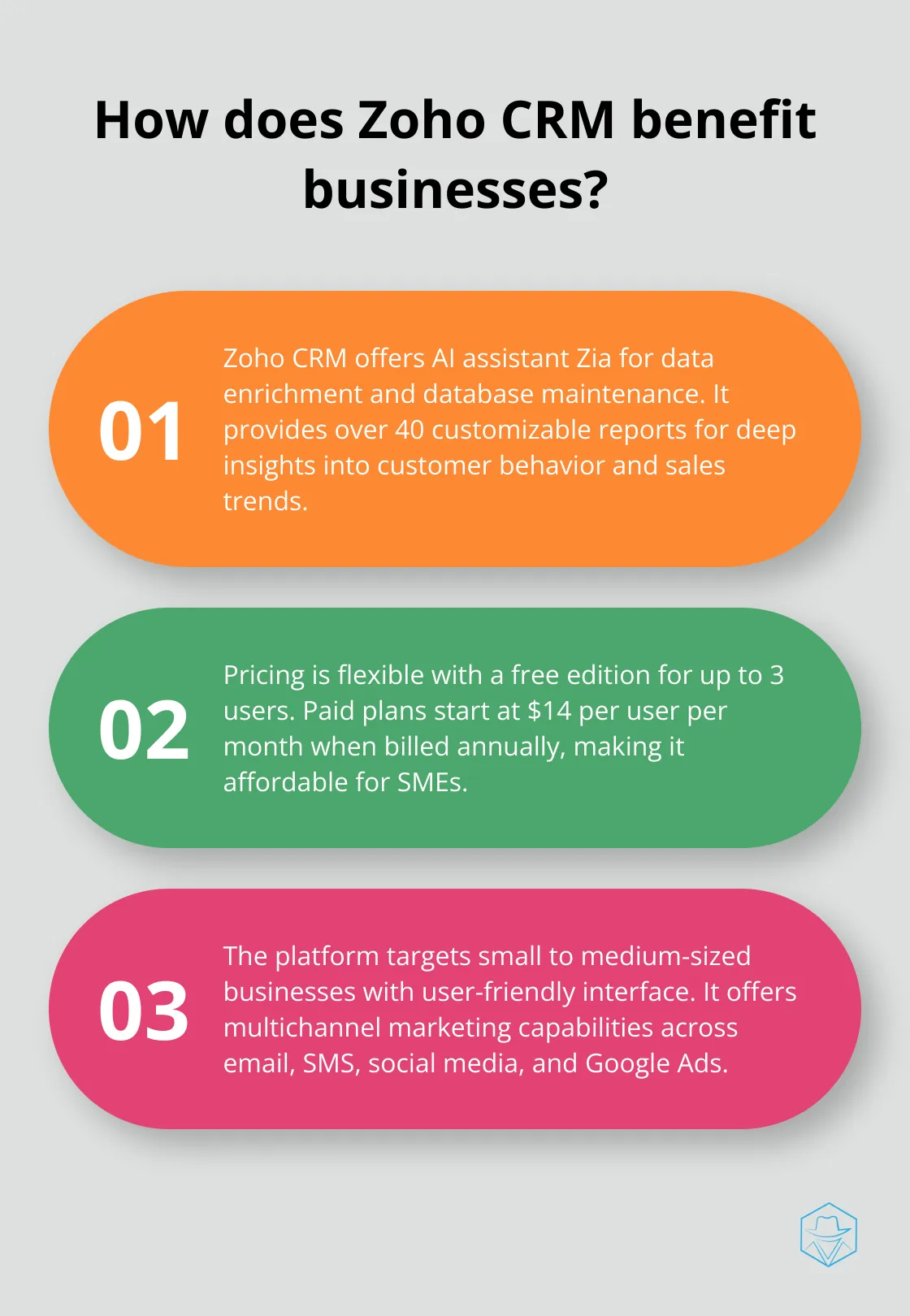
The platform offers over 40 customizable reports, providing businesses with deep insights into customer behavior, sales trends, and marketing effectiveness. This level of detail enables data-driven decision-making (a critical aspect in today’s competitive market).
Flexible Pricing Structure
Zoho CRM’s pricing flexibility is hard to beat. They offer a free edition for up to three users, making it an excellent option for startups or small teams just starting to explore CRM solutions. Paid plans start at $14 per user per month (billed annually), significantly undercutting many competitors in the market.
This pricing structure appeals particularly to small and medium-sized enterprises (SMEs) that need comprehensive CRM functionality without overspending. Even at these lower price points, Zoho doesn’t skimp on features, offering extensive customization options and AI-powered insights in its top-tier plans.
Ideal for Growing Businesses
Zoho CRM targets small to medium-sized businesses looking for an affordable yet feature-rich CRM solution. Its user-friendly interface allows teams to start using the platform quickly without extensive training.
Businesses seeking to improve their lead management processes, automate sales tasks, and gain better visibility into their sales pipeline will find Zoho CRM particularly useful. The platform’s multichannel marketing capabilities extend across email, SMS, social media, and Google Ads, making it a versatile tool for businesses aiming to expand their reach.
However, it’s important to note that some users have reported occasional bugs, particularly after updates. This is a factor to consider when evaluating long-term use and scalability.
Zoho CRM carves out a niche in the CRM landscape with its balance of affordability and functionality. While it may not have all the advanced features of some higher-priced alternatives, its value proposition is clear for businesses prioritizing cost-effectiveness without sacrificing essential CRM capabilities.
As we shift our focus to HubSpot CRM, we’ll explore how this platform compares to Zoho CRM in terms of features, pricing, and target audience.
What Sets HubSpot CRM Apart?
Powerful Marketing Automation
HubSpot CRM stands out in the market with its comprehensive marketing automation capabilities. Users can create and manage complex email campaigns, track customer journeys, and automate follow-ups based on specific triggers. This automation empowers marketing teams to focus on strategy rather than repetitive tasks.
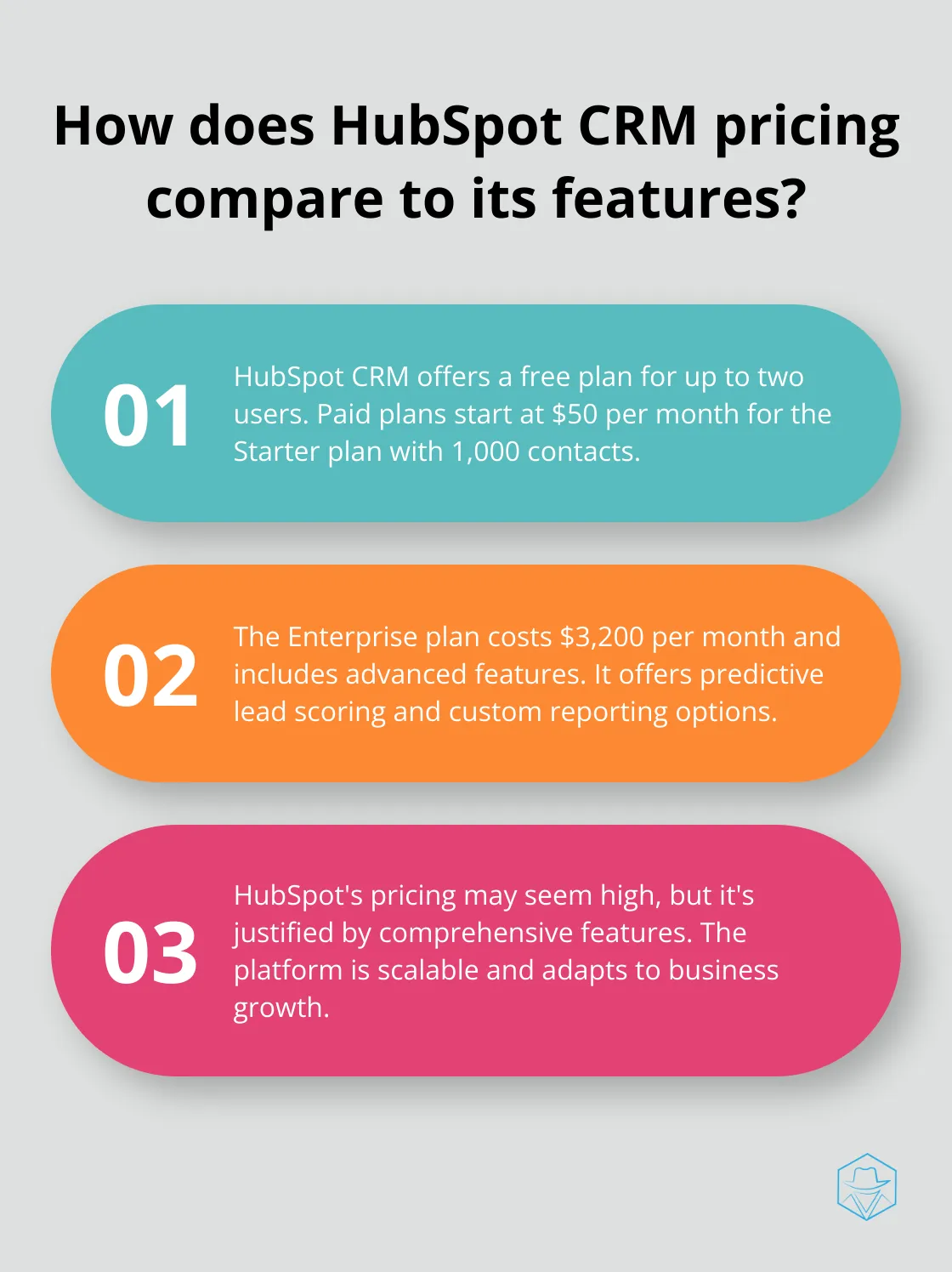
The reporting suite of HubSpot deserves special mention. It offers interactive dashboards and advanced analytics, providing businesses with deep insights into their marketing and sales performance. Unlike some competitors, HubSpot includes these essential analytics tools without additional costs (a significant advantage for budget-conscious organizations).
Scalable Pricing Structure
HubSpot’s pricing structure adapts to your business growth. The platform offers a robust free plan for up to two users, which appeals to small teams or startups. Paid plans begin at $50 per month for the Starter plan (including 1,000 contacts).
While this pricing may appear steep compared to alternatives, HubSpot justifies its cost with a comprehensive feature set. The Enterprise plan, priced at $3,200 per month, offers advanced features like predictive lead scoring and custom reporting options (tools that can significantly enhance large-scale operations).
Tailored for Growth-Focused Businesses
HubSpot CRM caters particularly well to mid-sized and large companies with complex internal structures. Its scalability makes it an excellent choice for businesses anticipating significant growth, as it accommodates expanding needs without requiring a platform switch.
The platform’s extensive customization options, including the ability to create custom objects, allow businesses to tailor the CRM to their specific needs. This flexibility, combined with HubSpot’s seamless integration across its suite of tools, provides a comprehensive view of the customer journey from initial contact to closed deal.
Potential Drawbacks
HubSpot’s wealth of features can overwhelm some users. The learning curve can prove steep, and smaller teams might find themselves paying for capabilities they don’t fully utilize.
Comparison with Alternatives
While Zoho CRM offers a more budget-friendly option with a solid feature set, HubSpot’s advanced marketing automation and scalability make it a strong contender for businesses prioritizing growth and comprehensive customer management. However, for businesses seeking a more cost-effective solution with robust communication features, Drop Cowboy’s platform offers an excellent alternative, combining advanced features like Mimic AI™ for personalized messaging with a user-friendly interface and global reach.
As we move forward, let’s examine how these two CRM giants stack up against each other in a head-to-head comparison of their key features and functionalities.
How Do Zoho CRM and HubSpot Compare?
User Experience and Interface
Zoho CRM presents a clean, intuitive interface that users quickly master. Its customizable dashboard allows teams to prioritize relevant information for their workflows. However, some users report occasional bugs after updates (which can disrupt the user experience).
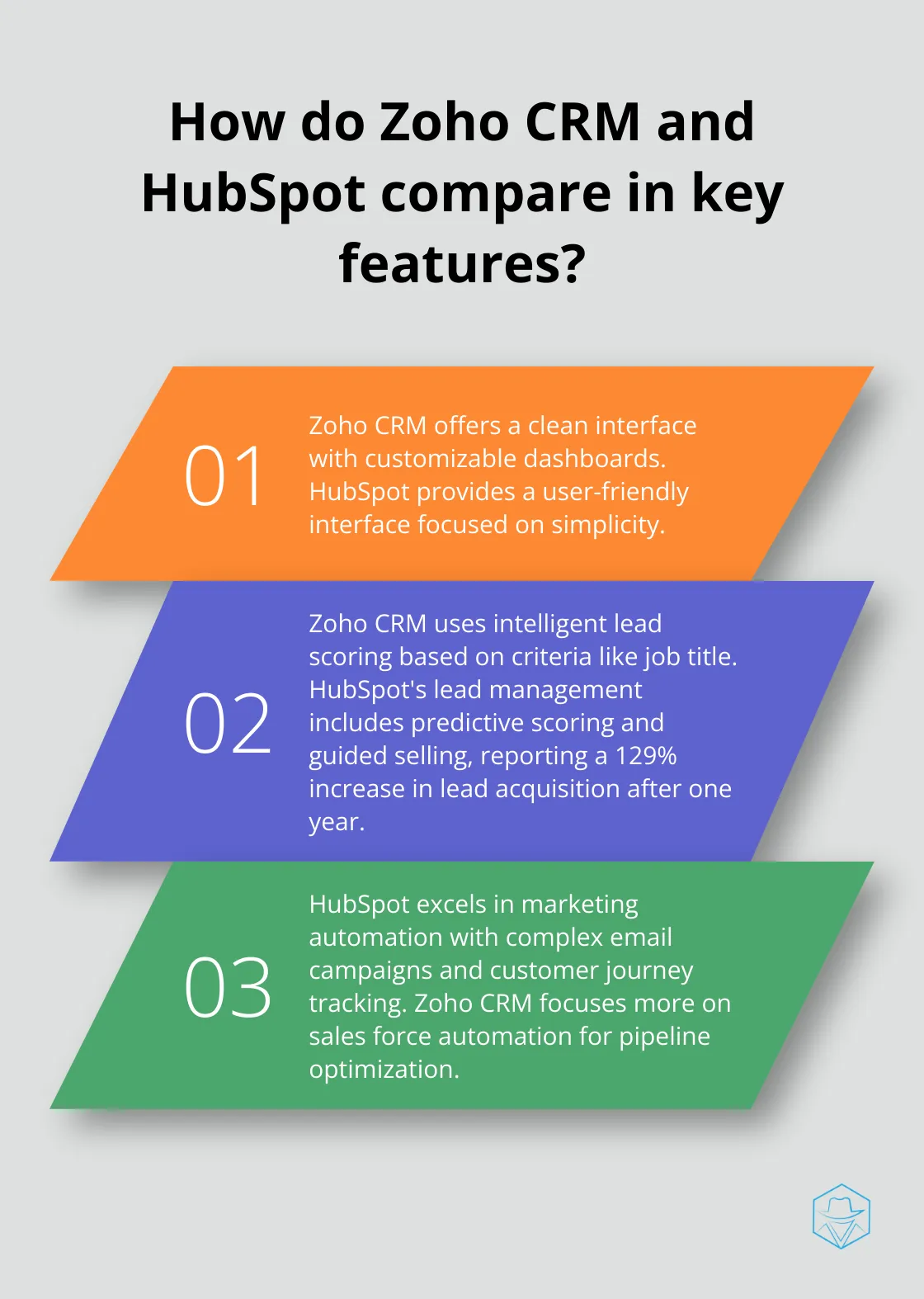
HubSpot boasts a visually appealing and user-friendly interface. The platform’s design focuses on simplicity, making it easy for non-technical users to navigate. However, the abundance of features can overwhelm some users (potentially leading to a steeper learning curve).
Lead Management and Customer Tracking
Both platforms excel in lead management, but their approaches differ. Zoho CRM’s intelligent lead scoring system assigns importance levels based on criteria like job title and location. This feature helps sales teams prioritize their efforts effectively.
HubSpot’s lead management tools include predictive lead scoring and guided selling. These AI-powered tools streamline the sales journey and enhance lead management efficiency. HubSpot users report a 129% increase in lead acquisition after just one year of using the platform.
Marketing Automation Capabilities
HubSpot takes the lead in marketing automation. Its tools allow users to create complex email campaigns, track customer journeys, and automate follow-ups based on specific triggers. This level of automation frees up marketing teams to focus on strategy rather than repetitive tasks.
Zoho CRM’s marketing automation features focus more on sales force automation. The platform provides tools for lead and deal management, which benefit sales-driven organizations looking to optimize their pipelines.
Sales Pipeline Management
Both platforms offer strong sales pipeline management tools, but with different strengths. Zoho CRM’s Blueprint feature helps sales teams define and standardize best practices, ensuring consistency across the sales process.
HubSpot’s pipeline management tools allow extensive customization of sales deal stages and automate notifications based on stage changes. The platform’s sales forecasting feature helps prioritize deals based on their likelihood to close, which can significantly impact sales teams’ performance.
Reporting and Analytics
Zoho CRM provides over 40 customizable reports, offering insights into customer behavior, sales trends, and marketing effectiveness. This level of detail enables data-driven decision-making in today’s competitive market.
HubSpot’s reporting suite features interactive dashboards and advanced analytics. HubSpot includes these essential analytics tools without additional costs, providing businesses with deep insights into their marketing and sales performance.
Final Thoughts
Zoho CRM and HubSpot offer distinct advantages for different business needs. Zoho CRM excels in affordability and sales automation, making it ideal for small to medium-sized companies focused on optimizing sales processes. HubSpot shines with comprehensive marketing automation and scalability, catering to larger organizations anticipating growth.
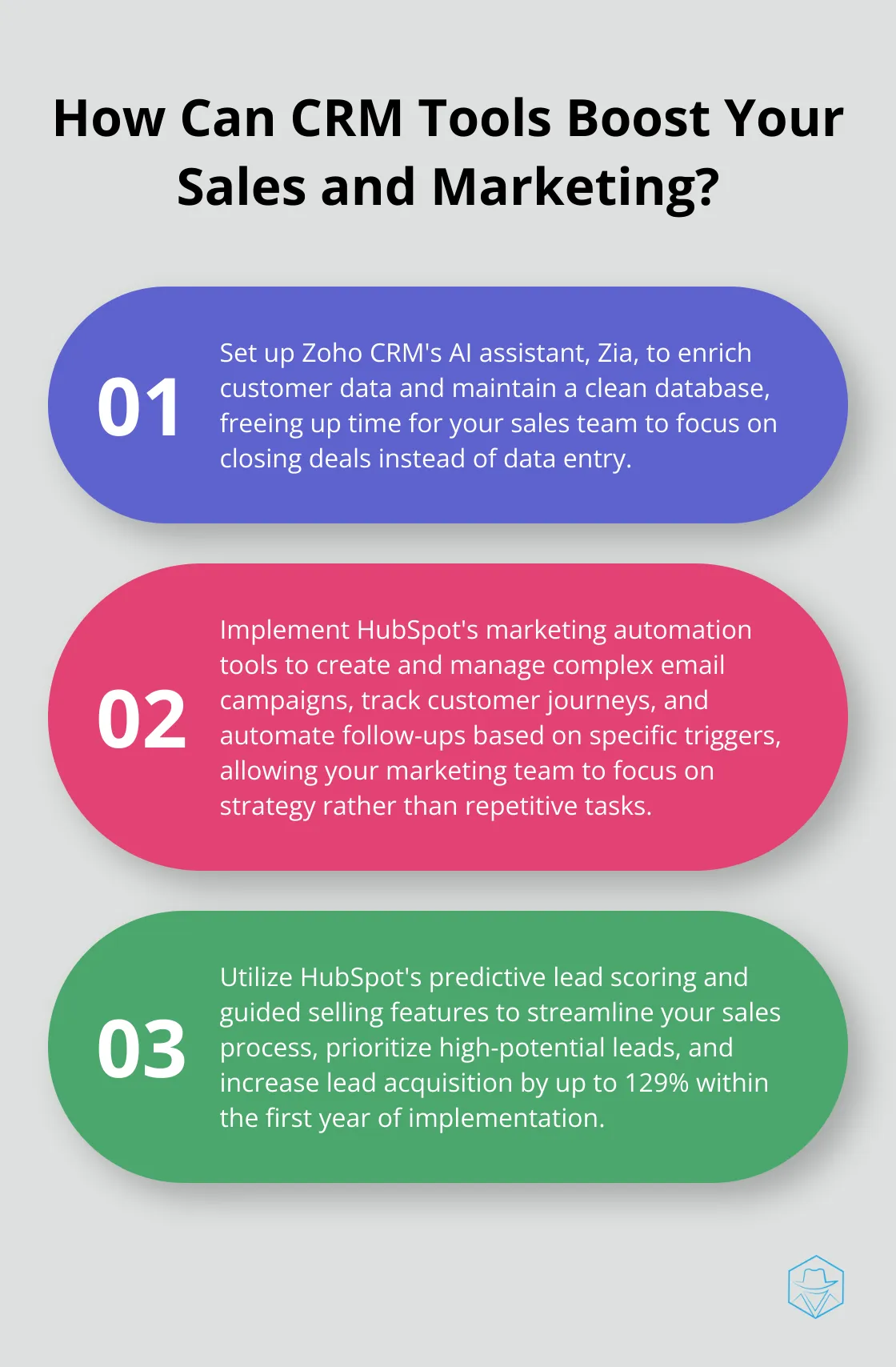
The choice between Zoho CRM vs HubSpot depends on your company’s size, budget, and specific requirements. While both platforms provide strong features, they may not address all communication needs fully. Drop Cowboy offers unique benefits such as ringless voicemail and SMS integration, which can enhance customer engagement and campaign reach.
We recommend you evaluate your needs thoroughly and test both platforms if possible. Consider complementary tools to create a comprehensive customer relationship management strategy. Your decision should align with your organization’s growth trajectory and budget constraints to drive your business forward effectively.
blog-dropcowboy-com
Related posts

February 26, 2025
Choosing the Right Ringless Voicemail Service Provider
Explore tips for choosing the right ringless voicemail service and make informed decisions with ease. Learn key factors and avoid common pitfalls today!

April 21, 2025
What is Klaviyo and How Can it Benefit Your Business?
Discover what Klaviyo is and how it can boost your business with personalized marketing strategies and advanced analytics.

April 7, 2025
Go High Level vs HubSpot: CRM Showdown
Compare Go High Level vs HubSpot in our CRM showdown, exploring features, pricing, and which platform could elevate your business strategy.

April 17, 2025
Best Dropshipping Apps to Supercharge Your Shopify Store
Boost your Shopify store with the best Shopify dropshipping apps. Explore efficient tools to enhance your e-commerce business effortlessly.

April 14, 2025
Crafting the Perfect Shopify Abandoned Cart Email
Boost sales by crafting the perfect Shopify abandoned cart email. Learn effective strategies to recover lost revenue today.

April 21, 2025
Integrating Marketing Automation with Salesforce
Integrate marketing automation with Salesforce for streamlined processes, increased efficiency, and higher ROI. Learn practical tips and proven techniques.